
HomeSetup Python Library
Because your Python code is not JUST a script !
HsPyLib is not just a Python library; it’s a gateway to elevating your programming experience to new heights. Built on established principles like SOLID, DRY (Don’t Repeat Yourself), KISS (Keep It Simple, Stupid), and YAGNI (You Ain’t Gonna Need It), HsPyLib offers a wealth of frameworks and features. It empowers you to craft sophisticated Python3 applications, adhering to the philosophy that code should not merely be a simple script - it should be a part of the ‘PYCSNBASS’ (Python Code Should Not Be A Simple Script) mindset.
This project is a part of the HomeSetup project.
Key Features
- Seamless installation process.
- Application manager offering a helpful scaffold for Python applications.
- Widgets manager for running both ‘built-in’ and custom Python widgets.
- Improved TUI (Text User Interface) helpers and input methods to enhance your User Experience with terminal applications.
- CRUD (Create, Read, Update, Delete) framework aiding with databases, repositories, and services.
- HTTP request helpers for simplified communication.
- Support for enabling Properties and AppConfigs using popular extensions like .properties, toml, yml, and more.
- Code rigorously tested and consistently adhering to Pylint standards.
- Utilizes the Gradle build system with numerous extensions.
- Diverse set of demos to facilitate a deeper understanding of the library.
- AI model integrations (currently supporting OpenAI).
Create beautiful menu-select inputs
class SelectableItem:
def __init__(self, name: str, value: str):
self.name = name
self.value = value
def __str__(self):
return f"Name: {self.name} Value: {self.value}"
def __repr__(self):
return str(self)
if __name__ == "__main__":
quantity = 22
digits = len(str(quantity))
it = [SelectableItem(f"Item-{n:>0{digits}}", f"Value-{n:>0{digits}}") for n in range(1, quantity)]
sel = mselect(it)
print(str(sel))
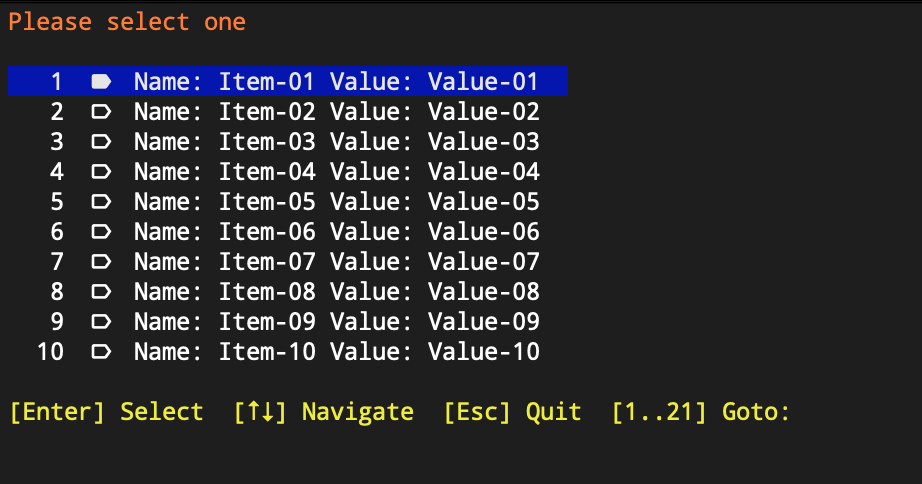
And create beautiful menu-choose inputs
class ChooseableItem:
def __init__(self, name: str, value: str):
self.name = name
self.value = value
def __str__(self):
return f"Name: {self.name} Value: {self.value}"
def __repr__(self):
return str(self)
if __name__ == "__main__":
quantity = 22
digits = len(str(quantity))
it = [ChooseableItem(f"Item-{n:>0{digits}}", f"Value-{n:>0{digits}}") for n in range(1, quantity)]
sel = mchoose(it, [n % 2 == 0 for n in range(1, quantity)])
print(str(sel))
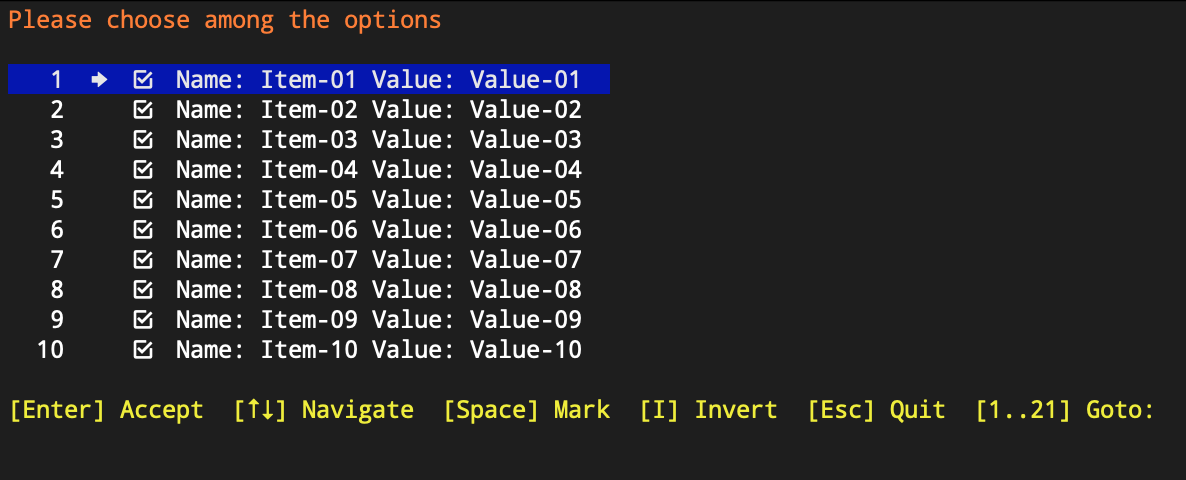
And also, create beautiful form inputs
from clitt.core.tui.minput.input_validator import InputValidator
from clitt.core.tui.minput.minput import MenuInput, minput
if __name__ == "__main__":
# fmt: off
form_fields = MenuInput.builder() \
.field() \
.label('letters') \
.validator(InputValidator.letters()) \
.build() \
.field() \
.label('word') \
.validator(InputValidator.words()) \
.build() \
.field() \
.label('number') \
.validator(InputValidator.numbers()) \
.min_max_length(1, 4) \
.build() \
.field() \
.label('masked') \
.itype('masked') \
.value('|##::##::## @@') \
.build() \
.field() \
.label('selectable') \
.itype('select') \
.value('one|two|three') \
.build() \
.field() \
.label('checkbox') \
.itype('checkbox') \
.build() \
.field() \
.label('password') \
.itype('password') \
.validator(InputValidator.anything()) \
.min_max_length(4, 8) \
.build() \
.field() \
.label('read-only') \
.access_type('read-only') \
.value('READ-ONLY') \
.build() \
.build()
# fmt: on
result = minput(form_fields)
print(result.__dict__ if result else "None")
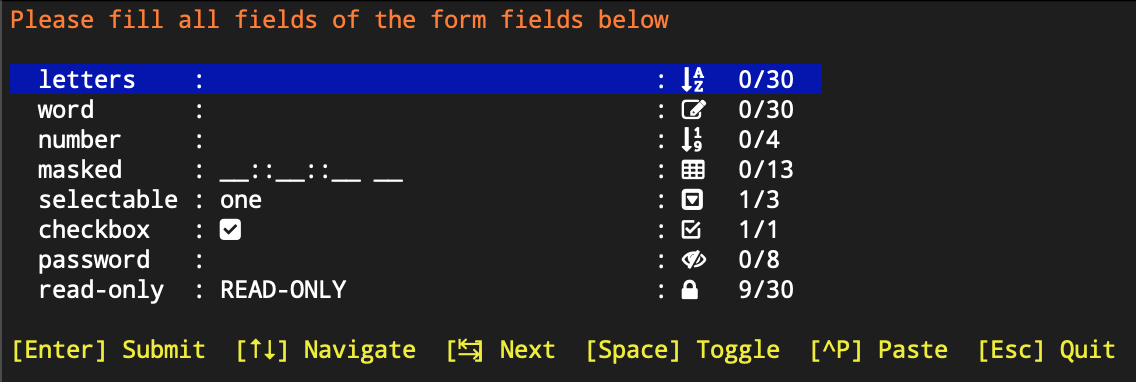
Or even, create nice dashboards:
if __name__ == "__main__":
# fmt: off
dashboard_items = MenuDashBoard.builder() \
.item() \
.icon(DashboardIcons.POWER) \
.tooltip('Do something') \
.on_trigger(lambda: print('Something')) \
.build() \
.item() \
.icon(DashboardIcons.MOVIE) \
.tooltip('Another something') \
.on_trigger(lambda: print('Another')) \
.build() \
.item() \
.icon(DashboardIcons.NOTIFICATION) \
.tooltip('Notify something') \
.on_trigger(lambda: print('Notification')) \
.build() \
.item() \
.icon(DashboardIcons.LIST) \
.tooltip('List everything') \
.on_trigger(lambda: print('List')) \
.build() \
.item() \
.icon(DashboardIcons.DATABASE) \
.tooltip('Database console') \
.on_trigger(lambda: print('Database')) \
.build() \
.item() \
.icon(DashboardIcons.EXIT) \
.tooltip('Exit application') \
.on_trigger(lambda: print('Exit')) \
.build() \
.build()
# fmt: on
result = mdashboard(dashboard_items)
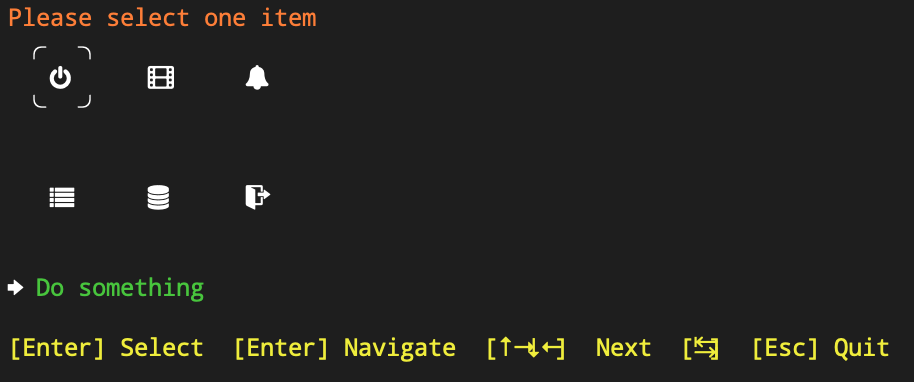
And even more, create beautiful menus !
if __name__ == "__main__":
# fmt: off
main_menu = TUIMenuFactory \
.create_main_menu('TUI Main Menu', tooltip='Test Terminal UI Menus') \
.with_item('Sub-Menu-1') \
.with_action("DO IT 1", "Let's do it") \
.on_trigger(lambda x: print("ACTION 1", x)) \
.with_view("Just a View 1", "Show the view 1") \
.on_render("MY BEAUTIFUL VIEW 1") \
.with_action("Back", "Back to the previous menu") \
.on_trigger(TUIMenuUi.back) \
.then() \
.with_item('Sub-Menu-2') \
.with_action("DO IT 2", "Let's do it too") \
.on_trigger(lambda x: print("ACTION 2", x)) \
.with_view("Just a View 2", "Show the view 2") \
.on_render("MY BEAUTIFUL VIEW 2") \
.with_action("Back", "Back to the previous menu") \
.on_trigger(TUIMenuUi.back) \
.then() \
.then() \
.build()
# fmt: on
TUIMenuUi(main_menu, "TUI Main Menu").execute()
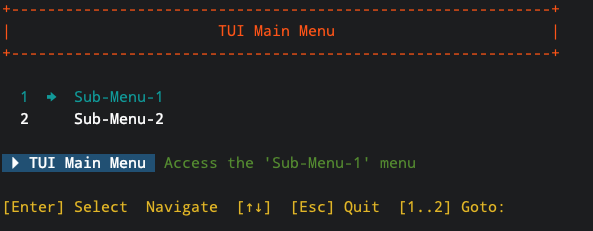
PyPi Modules
- A CLI Terminal tools.
- Datasource framework.
- A Firebase integration tool.
- A PyQt application framework.
- Core HomeSetup library.
- A Kafka manager application tool.
- A System Settings application tool.
- A Vault application tool.
Installation
Requirements
Python
- Python 3.10 and higher
Operating Systems
- Darwin
- High Sierra and higher
- Linux
- Ubuntu 16 and higher
- CentOS 7 and higher
- Fedora 31 and higher
You may want to install HsPyLib on other OS’s and it will probably work, but there are no guarantees that it WILL ACTUALLY WORK.
Required software
The following software are required:
- Git (To clone the github repository)
- Gradle (To build the HsPyLib project)
There are some python dependencies, but they will be automatically downloaded when the build runs.
PyPi
To install HsPyLib from PyPi issue the command:
# python3 -m pip install hspylib
To upgrade HsPyLib use the command:
# python3 -m pip install hspylib --upgrade
Additional modules that can also be installed:
- CLItt :
# python3 -m pip install hspylib-clittto install HsPyLib CLI terminal tools. - Firebase :
# python3 -m pip install hspylib-firebaseto install HsPyLib Firebase application. - Vault :
# python3 -m pip install hspylib-vaultto install HsPyLib Vault application. - Kafman :
# python3 -m pip install hspylib-kafmanto install Kafka manager. - Datasource :
# python3 -m pip install hspylib-datasourceto install datasource helpers. - HQT :
# python3 -m pip install hspylib-hqtto install HsPyLib PyQt framework.
GitHub
To clone HsPyLib into your local machine type the command:
# git clone https://github.com/yorevs/hspylib.git
Documentation
The API documentation can be found here
Support
Your support and contributions are greatly appreciated in helping us improve and enhance HomeSetup. Together, we can make it even better!
You can support HomeSetup by donating or contributing code. Feel free to contact me for further details. When making code contributions, please make sure to review our guidelines and adhere to our code of conduct.
You can also sponsor it by using our GitHub Sponsors page.
This project is already supported by:
Thank you <3 !!
Known Issues
- [In-Progress] We are aware that there is a problems when using python@3.12 and we are already working on a fix.

